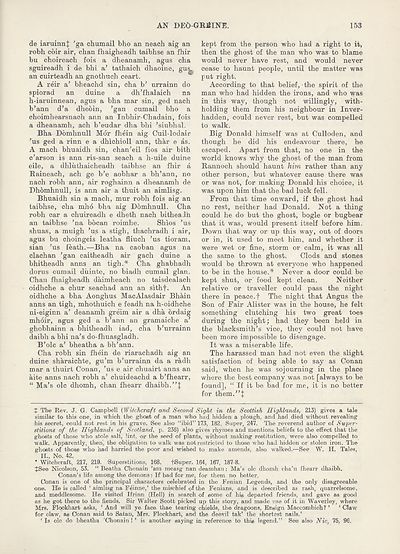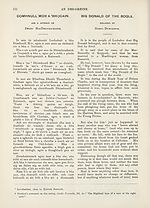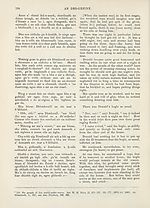An Comunn Gàidhealach Publications > Deo-gréine > Volume 17, October 1921 to September 1922
(161) Page 153
Download files
Complete book:
Individual page:
Thumbnail gallery: Grid view | List view

AN DEO-GRJtlNE.
153
de iaruinnf 'ga chumail bho an neach aig an
robh coir air, chan fhaigheadh taibhse an fhir
bu choireach fois a dheanamh, agus cha
sguireadh i de bhi a’ tathaich dhaoine, gus^
an cuirteadh an gnotlmch ceart.
A reir a’ bheachd sin, cha b’ urrainn do
spiorad an duine a dh’fhalaich na
h-iaruinnean, agus a bha mar sin, ged nach
b’ann d’a dheoin, ’gan cumail bho a
ehoimhearsnach ann an Inbhir-Chadain, fois
a dheanamh, ach b’eudar dha bhi ’siubhal.
Bha Dbmhnull Mor fhein aig Cuil-lodair
"‘us ged a rinn e a dhichioll ann, thar e as.
A mach bhuaidh sin, chan’eil fios air bith
c’arson is ann ris-san seach a h-uile duine
eile, a dhluthaicheadh taibhse an fhir a
Eaineach, ach ge b’e aobhar a bh’ann, no
nach robh ann, air roghainn a dheanamh de
Bhomhnull, is ann air a thuit an aimlisg.
Bhuaidh sin a mach, mnr robh fois aig an
taibhse, cha mho bha aig Dbmhnull. Cha
robh car a chuireadh e dheth nach bithealh
an taibhse ’na bbcan roimhe. Shxos ’us
shuas, a muigh ’us a stigh, thachradh i air,
agus bu choingeis leatha fliuch ’us tioram,
sian ’us feath.—Bha na caoban agus na
clachan ’gan caitheadh air gach duine a
bhitheadh anns an tigh.* Cha ghabhadh
dorus cumail duinte, no biadh cumail glan.
Chan fhaigheadh daimheach no taisdealach
oidhche a chur seachad ann an sithf. An
oidhche a bha Aonghus MacAlasdair Bhain
anns an tigh, mhothuich e feadh na h-oidhche
ni-eiginn a’ deanamh greim air a dha brdaig
mhoir, agus ged a b’ann an gramaiche a’
ghobhainn a bhitheadh iad, cha b’urrainn
daibh a bhi na’s do-fhuasgladh.
B’olc a’ bheatha a bh’ann.
Cha robh sin fhein de riarachadh aig an
duine sharaichte, gu’m b’urrainn da a radh
mar a thuirt Conan, ’us e air chuairt anns an
kite anns nach robh a’ chuideachd a b’fhearr,
“ Ma’s ole dhomh, chan fhearr dhaibh.”J
kept from the person who had a right to it,
then the ghost of the man who was to blame
would never have rest, and would never
cease to haunt people, until the matter was
put right.
According to that belief, the spirit of the
man who had hidden the irons, and who was
in this way, though not willingly, with¬
holding them from his neighbour in Inver-
hadden, could never rest, but was compelled
to walk.
Big Donald himself was at Culloden, and
though he did his endeavour there, he
escaped. Apart from that, no one in the
world knows why the ghost of the man from
Rannoch should haunt him rather than any
other person, but whatever cause there Was
or was not, for making Donald his choice, it
was upon him that the bad luck fell.
From that time onward, if the ghost had
no rest, neither had Donald. Not a thing
could he do but the ghost, bogle or bugbear
that it was, would present itself before him.
Down that way or up this way, out of doors
or in, it used to meet him, and whether it
were wet or fine, storm or calm, it was all
the same to the ghost. Clods and stones
would be thrown at everyone who happened
to be in the house.* Never a door could be
kept shut, or food kept clean. Neither
relative or traveller could pass the night
there in peace.f The night that Angus the
Son of Fair Alister was in the house, he felt
something clutching his two great toes
during the night; had they been held in
the blacksmith’s vice, they could not have
been more impossible to disengage.
It was a miserable life.
The harassed man had not even the slight
satisfaction of being able to say as Conan
said, when he was sojourning in the place
where the best company was not [always to be
found], “ If it be bad for me, it is no better
for them.”|
t The Rev. J. G. Campbell (Witchcraft and Second Sight in the Scottish Highlands, 213) gives a tale
similar to this one, in which the ghoet of a man who had hidden a plough, and had died without revealing
his secret, could not rest in his grave. See also “ibid” 173, 182, Super, 247. The reverend author of Super¬
stitions of the Highlands of Scotland, p. 236) also gives rhymes and mentions beliefs to the effect that the
ghosts of those who stole salt, lint, or the seed of plants, without making restitution, were also compelled to
walk. Apparently, then', the obligation to walk was not restricted to those who had hidden or stolen iron. The
ghosts of those who had harried the poor and wished to make amends, also walked.—See W. H. Tales,
II., No. 42.
* Witchcraft, 217, 219. Superstitions, 168. tSuper. 164, 167, 187-8.
JSee Nicolson, 53. “ Beatha Chonain ’am measg nan deamhan: Ma’s ole dhomh cha’n fhearr dhaibh.
Conan’s life among the demons: If bad for me, for them no better.
Conan is one of the principal characters celebrated in the Fenian Legends, and the only disagreeable
one. Hie is called ‘ aimlisg na Feinne,’ the mischief of the Fenians, and is described as rash, quarrelsome,
and meddlesome. He visited Ifrinn (Hell) in search of some of his departed friends, and gave as good
as he got there to the fiends. Sir Walter Scott picked up this story, and made use of it in Waverley, where
Mrs. Flockhart asks, ‘ And will ye face thae tearing chields, the dragoons, Ensign Maccombich? ’ ‘ Claw
for claw, as Conan said to Satan, Mrs. Flockhart, and the deevil tak’ the shortest nails.’
‘ Is ole do bheatha ’Chonain! ’ is another saying in reference to this legend.” See also Nic, 75, 96,
153
de iaruinnf 'ga chumail bho an neach aig an
robh coir air, chan fhaigheadh taibhse an fhir
bu choireach fois a dheanamh, agus cha
sguireadh i de bhi a’ tathaich dhaoine, gus^
an cuirteadh an gnotlmch ceart.
A reir a’ bheachd sin, cha b’ urrainn do
spiorad an duine a dh’fhalaich na
h-iaruinnean, agus a bha mar sin, ged nach
b’ann d’a dheoin, ’gan cumail bho a
ehoimhearsnach ann an Inbhir-Chadain, fois
a dheanamh, ach b’eudar dha bhi ’siubhal.
Bha Dbmhnull Mor fhein aig Cuil-lodair
"‘us ged a rinn e a dhichioll ann, thar e as.
A mach bhuaidh sin, chan’eil fios air bith
c’arson is ann ris-san seach a h-uile duine
eile, a dhluthaicheadh taibhse an fhir a
Eaineach, ach ge b’e aobhar a bh’ann, no
nach robh ann, air roghainn a dheanamh de
Bhomhnull, is ann air a thuit an aimlisg.
Bhuaidh sin a mach, mnr robh fois aig an
taibhse, cha mho bha aig Dbmhnull. Cha
robh car a chuireadh e dheth nach bithealh
an taibhse ’na bbcan roimhe. Shxos ’us
shuas, a muigh ’us a stigh, thachradh i air,
agus bu choingeis leatha fliuch ’us tioram,
sian ’us feath.—Bha na caoban agus na
clachan ’gan caitheadh air gach duine a
bhitheadh anns an tigh.* Cha ghabhadh
dorus cumail duinte, no biadh cumail glan.
Chan fhaigheadh daimheach no taisdealach
oidhche a chur seachad ann an sithf. An
oidhche a bha Aonghus MacAlasdair Bhain
anns an tigh, mhothuich e feadh na h-oidhche
ni-eiginn a’ deanamh greim air a dha brdaig
mhoir, agus ged a b’ann an gramaiche a’
ghobhainn a bhitheadh iad, cha b’urrainn
daibh a bhi na’s do-fhuasgladh.
B’olc a’ bheatha a bh’ann.
Cha robh sin fhein de riarachadh aig an
duine sharaichte, gu’m b’urrainn da a radh
mar a thuirt Conan, ’us e air chuairt anns an
kite anns nach robh a’ chuideachd a b’fhearr,
“ Ma’s ole dhomh, chan fhearr dhaibh.”J
kept from the person who had a right to it,
then the ghost of the man who was to blame
would never have rest, and would never
cease to haunt people, until the matter was
put right.
According to that belief, the spirit of the
man who had hidden the irons, and who was
in this way, though not willingly, with¬
holding them from his neighbour in Inver-
hadden, could never rest, but was compelled
to walk.
Big Donald himself was at Culloden, and
though he did his endeavour there, he
escaped. Apart from that, no one in the
world knows why the ghost of the man from
Rannoch should haunt him rather than any
other person, but whatever cause there Was
or was not, for making Donald his choice, it
was upon him that the bad luck fell.
From that time onward, if the ghost had
no rest, neither had Donald. Not a thing
could he do but the ghost, bogle or bugbear
that it was, would present itself before him.
Down that way or up this way, out of doors
or in, it used to meet him, and whether it
were wet or fine, storm or calm, it was all
the same to the ghost. Clods and stones
would be thrown at everyone who happened
to be in the house.* Never a door could be
kept shut, or food kept clean. Neither
relative or traveller could pass the night
there in peace.f The night that Angus the
Son of Fair Alister was in the house, he felt
something clutching his two great toes
during the night; had they been held in
the blacksmith’s vice, they could not have
been more impossible to disengage.
It was a miserable life.
The harassed man had not even the slight
satisfaction of being able to say as Conan
said, when he was sojourning in the place
where the best company was not [always to be
found], “ If it be bad for me, it is no better
for them.”|
t The Rev. J. G. Campbell (Witchcraft and Second Sight in the Scottish Highlands, 213) gives a tale
similar to this one, in which the ghoet of a man who had hidden a plough, and had died without revealing
his secret, could not rest in his grave. See also “ibid” 173, 182, Super, 247. The reverend author of Super¬
stitions of the Highlands of Scotland, p. 236) also gives rhymes and mentions beliefs to the effect that the
ghosts of those who stole salt, lint, or the seed of plants, without making restitution, were also compelled to
walk. Apparently, then', the obligation to walk was not restricted to those who had hidden or stolen iron. The
ghosts of those who had harried the poor and wished to make amends, also walked.—See W. H. Tales,
II., No. 42.
* Witchcraft, 217, 219. Superstitions, 168. tSuper. 164, 167, 187-8.
JSee Nicolson, 53. “ Beatha Chonain ’am measg nan deamhan: Ma’s ole dhomh cha’n fhearr dhaibh.
Conan’s life among the demons: If bad for me, for them no better.
Conan is one of the principal characters celebrated in the Fenian Legends, and the only disagreeable
one. Hie is called ‘ aimlisg na Feinne,’ the mischief of the Fenians, and is described as rash, quarrelsome,
and meddlesome. He visited Ifrinn (Hell) in search of some of his departed friends, and gave as good
as he got there to the fiends. Sir Walter Scott picked up this story, and made use of it in Waverley, where
Mrs. Flockhart asks, ‘ And will ye face thae tearing chields, the dragoons, Ensign Maccombich? ’ ‘ Claw
for claw, as Conan said to Satan, Mrs. Flockhart, and the deevil tak’ the shortest nails.’
‘ Is ole do bheatha ’Chonain! ’ is another saying in reference to this legend.” See also Nic, 75, 96,
Set display mode to:
![]() Universal Viewer |
Universal Viewer | ![]() Mirador |
Large image | Transcription
Mirador |
Large image | Transcription
| An Comunn Gàidhealach > An Comunn Gàidhealach Publications > Deo-gréine > Volume 17, October 1921 to September 1922 > (161) Page 153 |
|---|
| Permanent URL | https://digital.nls.uk/127171905 |
|---|
| Description | Leabhar 17, Treasamh Mios an Fhoghair 1921 gu Dara Mìos an Fhoghair 1922 |
|---|---|
| Attribution and copyright: |
|
| Description | This contains items published by An Comunn, which are not specifically Mòd-related. It includes journals, annual reports and corporate documents, policy statements, educational resources and published plays and literature. It is arranged alphabetically by title. |
|---|
| Description | A collection of over 400 items published by An Comunn Gàidhealach, the organisation which promotes Gaelic language and culture and organises the Royal National Mòd. Dating from 1891 up to the present day, the collection includes journals and newspapers, annual reports, educational materials, national Mòd programmes, published Mòd literature and music. |
|---|---|
| Additional NLS resources: |
|

